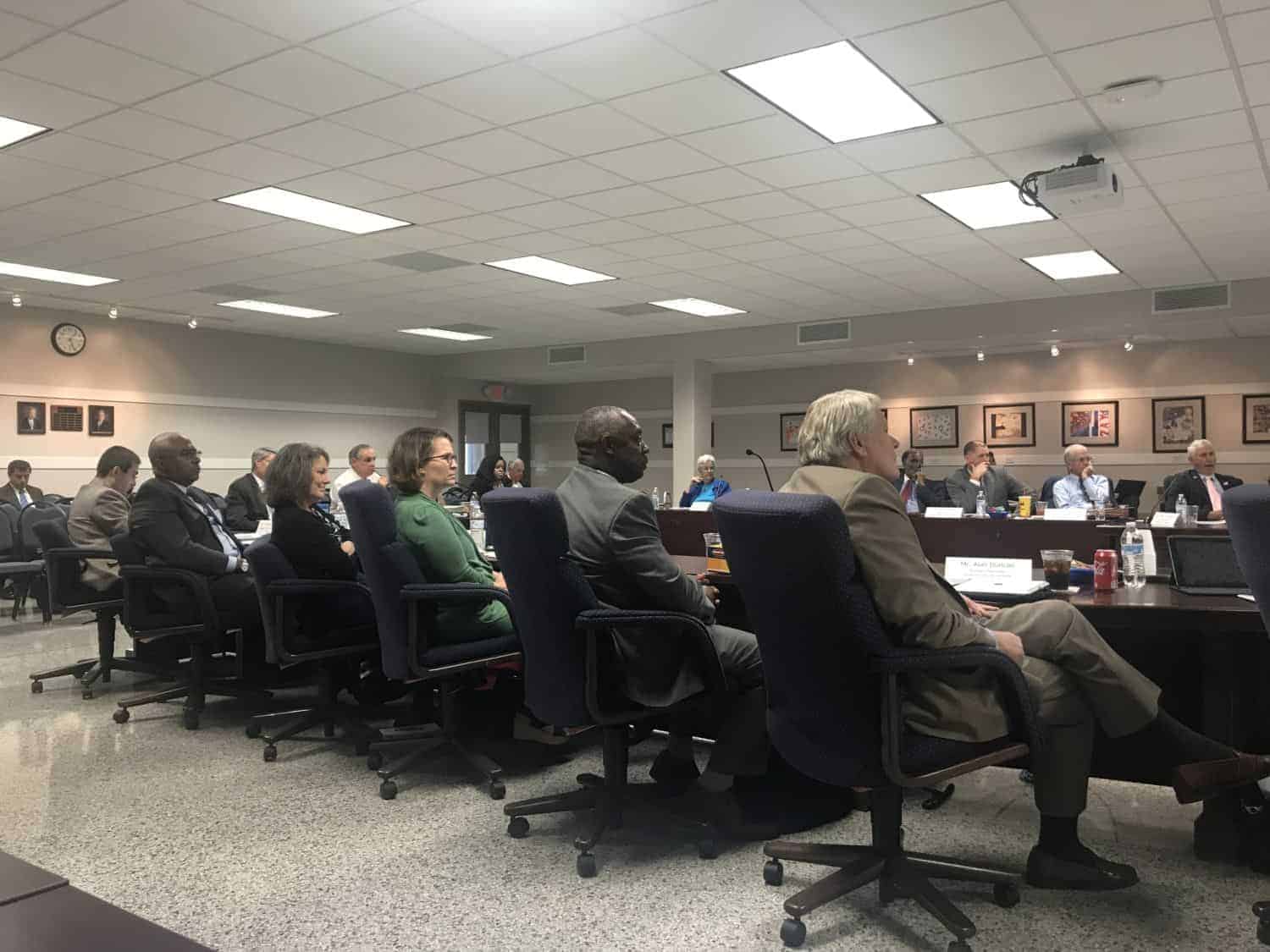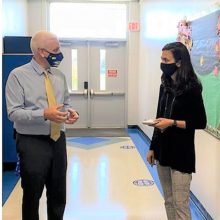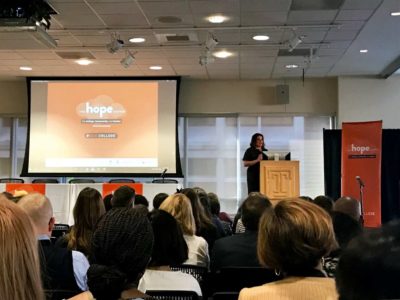On Tuesday, the Governor’s Commission on Access to Sound Basic Education convened in Fayetteville to consider the role that principals play in ensuring that North Carolina meets its obligation to provide all students with access to a sound basic education. Tuesday’s meeting was part of the ongoing work of the commission to provide recommendations on how the state can meet the requirements of the 1977 Leandro decision. Previous meetings of the commission focused on topics such as school funding and early childhood education.
The commission will meet again on Dec. 4. Future meeting dates have been scheduled through April 2019, after which the commission is expected to craft a final report. According to Geoff Coltrane, senior education advisor to Governor Roy Cooper, a website that explains the commission’s work and offers links to all previous meeting materials will be available to the public soon.
Updates from work groups
During the July meeting, the commission split into five work groups: early childhood/whole child, finances and resources, teachers, principals, and assessments. Since then, those work groups have met multiple times, often via phone call, to dig deeper into each of their respective topic areas. At the beginning of Tuesday’s meeting, representatives from three of these work groups gave updates on the progress of their work.
Henrietta Zalkind provided an update on the work of the early childhood/whole child work group. Zalkind said the group has been considering recommendations such as expanding Smart Start, expanding NC Pre-K, and using this infrastructure of early childhood education to build family support.
Jim Deal provided an update on the work of the finances and resources work group. Deal said the group has been looking at the school funding formula and considering what changes would be desirable to provide adequate resources for schools, including the distribution of teachers. Deal also said the group has been considering the financial impacts of expanding school choice and the appropriate amount of flexibility and accountability given to local authorities in the use of state funds.
Leslie Winner provided an update on the work of the teachers group. Winner said the group began by considering focusing on the definition that the court gave for a “well-trained” teacher: they must be competent, certified, well-trained, and use effective teaching methods that provide differentiated instruction and remediation to each student in the classroom. According to Winner, this definition sets an appropriate but high standard as it requires much more than just a certified teacher in every classroom.
“I personally think about this teacher in every classroom kind of like a train going down the track with different stops: recruit, prepare, place, induct, pay, support, and provide career opportunities,” said Winner.
Winner also said the teacher group is considering how to improve teacher recruitment efforts in North Carolina. Winner pointed to South Carolina’s teacher recruitment effort called CERRA as an example of a coordinated effort from which the group hopes to learn.
Presentations
Following updates from the work groups, a series of presentations and panels were given on various aspects of principal preparation in North Carolina.
Dr. Bonnie Fusarelli, a professor at NC State University and the director of the Northeast Leadership Academy, began with an overview of the principal pipeline in North Carolina. Fusarelli asked the commission members to consider principals in a personal way, saying, “Put into your minds’ eye an eight-year-old that you love … and picture them walking into their third-grade classroom. And as we’re talking about the various approaches, I want you to think about what kind of principal you would want for that child.”
She went on to explain the role of effective principals in ensuring student achievement, describing them as multipliers of effective teaching. Fusarelli then outlined the multiple stresses that principals face in their jobs and discussed the negative impacts of a 20 percent national principal turnover rate. She then walked the commission members through each of the pathways to principal licensure in North Carolina, discussing the positive and negative aspects of each. Her slides can be found below.
Next, a panel facilitated by Dr. Tom Williams of Strategic Educational Alliances, Inc. discussed the strengths and challenges of the principal pipeline in North Carolina. Panel members included Dr. Mary Hemphill, principal of Carver Middle School; Jusmar Maness, principal of Southern Middle School; Dr. Freddie Williamson, superintendent of Hoke County Schools; and Minnie Forte-Brown, Board of Education member for Durham Public Schools.
Williams’ first question was about the key challenges North Carolina districts and schools are facing in recruiting, training, and retaining principals.
“As we talk about making sure that we have qualified and effective principals in their seats, we also have to keep in mind that out of the 115 districts across our state, the context of leadership from the coastal region all the way to Piedmont to the mountains is very, very different,” said Hemphill. “You not only have your Title 1 schools but you also have your high-wealth schools and those require a leader that is able to speak to the specific challenges that come from family and community engagement, allocating resources with a Title 1 budget, or making sure student achievement is on the forefront of building capacity and ensuring that you have teachers who you’re growing because they have the most contact hours with those students.”
Then, Williams asked about challenges that principals face in providing strong instruction leadership in their schools.
“The way you instruct someone is actually not just with subject matter, but also with making a connection with the student. That means you have to know this kid, you have to make some kind of attempt to know that family, to know those children, as Mary said — to know that community. We’re talking about the principal is the CEO that takes all of that, balances all of those balls,” said Forte-Brown. “The teacher teaches the student, the principal works with the whole population of children.”
The next presentation focused on recruiting and preparing principals for the job. The commission heard from the directors of principal preparation programs at NC State University, East Carolina University, and UNC-Greensboro. Their slides can be found below.
Following these presentations, commission member Dr. Fouad Abd-El-Khalick, dean of the School of Education at UNC-Chapel Hill, said that many of the most innovative and effective models in principal preparation are coming from more traditional universities, such as those that presented.
“The issues associated with teacher prep and principal prep are very similar — and our answers are not shorter, cheaper, dirtier programs. Our answers are high-quality programs that are replicated in teacher prep elsewhere,” said Abd-El-Khalick. “Whatever money we spend on prep of high-quality teachers and principals we will save on less turnover, higher student outcomes, and higher graduation rates.”
Dr. Tom Williams gave the final presentation on supporting and retaining principals. Williams detailed the Distinguished Leadership in Practice program offered by the North Carolina Principals and Assistant Principals’ Association. His slides can be found below.



